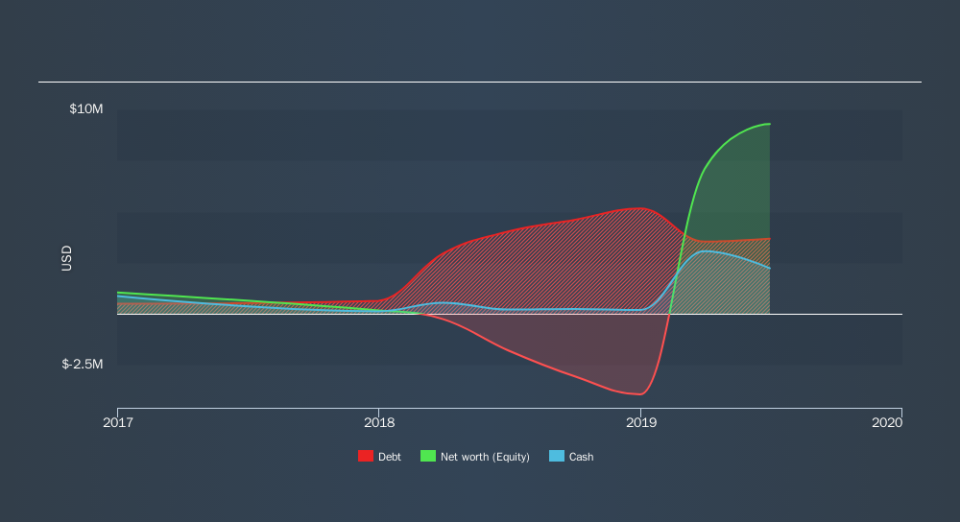Is IMAC Holdings (NASDAQ:IMAC) Using Too Much Debt?

Some say volatility, rather than debt, is the best way to think about risk as an investor, but Warren Buffett famously said that 'Volatility is far from synonymous with risk. So it seems the smart money knows that debt - which is usually involved in bankruptcies - is a very important factor, when you assess how risky a company is. We can see that IMAC Holdings, Inc. (NASDAQ:IMAC) does use debt in its business. But should shareholders be worried about its use of debt?
When Is Debt Dangerous?
Debt is a tool to help businesses grow, but if a business is incapable of paying off its lenders, then it exists at their mercy. In the worst case scenario, a company can go bankrupt if it cannot pay its creditors. However, a more common (but still painful) scenario is that it has to raise new equity capital at a low price, thus permanently diluting shareholders. Having said that, the most common situation is where a company manages its debt reasonably well - and to its own advantage. The first thing to do when considering how much debt a business uses is to look at its cash and debt together.
View our latest analysis for IMAC Holdings
What Is IMAC Holdings's Debt?
As you can see below, IMAC Holdings had US$3.68m of debt at June 2019, down from US$4.13m a year prior. However, it also had US$2.23m in cash, and so its net debt is US$1.45m.
How Strong Is IMAC Holdings's Balance Sheet?
Zooming in on the latest balance sheet data, we can see that IMAC Holdings had liabilities of US$6.15m due within 12 months and liabilities of US$6.97m due beyond that. Offsetting this, it had US$2.23m in cash and US$1.10m in receivables that were due within 12 months. So its liabilities outweigh the sum of its cash and (near-term) receivables by US$9.79m.
While this might seem like a lot, it is not so bad since IMAC Holdings has a market capitalization of US$18.0m, and so it could probably strengthen its balance sheet by raising capital if it needed to. But we definitely want to keep our eyes open to indications that its debt is bringing too much risk. There's no doubt that we learn most about debt from the balance sheet. But you can't view debt in total isolation; since IMAC Holdings will need earnings to service that debt. So if you're keen to discover more about its earnings, it might be worth checking out this graph of its long term earnings trend.
Over 12 months, IMAC Holdings reported revenue of US$12m, which is a gain of 686%, although it did not report any earnings before interest and tax. When it comes to revenue growth, that's like nailing the game winning 3-pointer!
Caveat Emptor
While we can certainly savour IMAC Holdings's tasty revenue growth, its negative earnings before interest and tax (EBIT) leaves a bitter aftertaste. Indeed, it lost a very considerable US$5.3m at the EBIT level. When we look at that and recall the liabilities on its balance sheet, relative to cash, it seems unwise to us for the company to have any debt. Quite frankly we think the balance sheet is far from match-fit, although it could be improved with time. However, it doesn't help that it burned through US$2.3m of cash over the last year. So suffice it to say we consider the stock very risky. For riskier companies like IMAC Holdings I always like to keep an eye on the long term profit and revenue trends. Fortunately, you can click to see our interactive graph of its profit, revenue, and operating cashflow.
At the end of the day, it's often better to focus on companies that are free from net debt. You can access our special list of such companies (all with a track record of profit growth). It's free.
We aim to bring you long-term focused research analysis driven by fundamental data. Note that our analysis may not factor in the latest price-sensitive company announcements or qualitative material.
If you spot an error that warrants correction, please contact the editor at editorial-team@simplywallst.com. This article by Simply Wall St is general in nature. It does not constitute a recommendation to buy or sell any stock, and does not take account of your objectives, or your financial situation. Simply Wall St has no position in the stocks mentioned. Thank you for reading.

